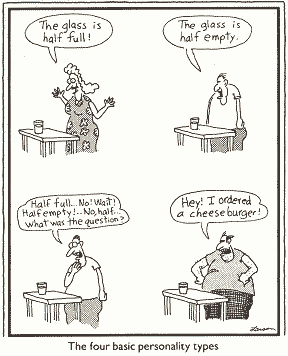There are plenty of factors that can hold back our careers, from lack of skills and education to more personal things like physical appearance or a family reputation.
But one factor many of us don’t consider is our personality: preferences, habits, quirks, and style. Yet it doesn’t have to be a liability. Research shows that with a little self-awareness—recognizing how you are different from others on your team, and particularly what others think of you—you can transform your personality from a liability to a career booster.
With a few small exceptions for star athletes and genius inventors, our ability to thrive in our careers is linked to getting along with supervisors, teammates, and clients. This requires us to understand and manage our own personalities–accepting who we are in the larger social order, and controlling various characteristics so they don’t end up controlling us.
We have some advice on how to capitalize on your natural predispositions, style, and preferences to help your career:
Bring Out Your Bright Side
All of us bring different personality-based strengths to the table: intuition, ambition, extraversion, collaboration, self-discipline, and curiosity. But just knowing what those strengths are isn’t enough to succeed; we also need to embrace these bright-side personality aspects because they are the raw material of our talent. In fact, talent is essentially an exaggerated version of our personality in the right context.
For example, imagine a person who’s confident, ambitious, and highly extroverted. Public relations work would be an excellent fit; on the other hand, a less extroverted but more disciplined and curious individual could thrive in a technical field like engineering.
Think of some of the more successful businesspeople in the past few decades. Would Apple’s Steve Wozniak have been as successful if he’d chosen a career as a stockbroker? Unlikely. Would Morgan Stanley’s CEO James Gorman have excelled in electrical engineering? Probably not. Both knew their strengths and reached their full potential as a result.
It’s cliché to say that all of us have some strengths, but when you look at generic personality characteristics it’s unarguably true, for three reasons:
- Because everybody has a personality
- Because those inherent behavioral tendencies will support adaptation to some environments
- Because in other environments the reverse personality profile will be more adaptive.
Let’s go back to extraversion: the trait may help you thrive as a salesperson or public speaker, but introversion will be better suited to independent work, attention to detail, and the ability to focus on thinking rather than socializing.
Most companies hire and promote based on key competencies. The specifics of those lists vary, but many items overlap. Competencies like EQ, judgment, resilience, collaboration, and global mindset appear over and over. Your personality is essential to unlocking these capacities. In fact, the bright side of your personality influences the competencies you are likely to develop, and how well.
Tame Your Dark Side
We’re naturally disinclined to focus on our negative qualities, but that neglect is a recipe for disaster. In fact, while awareness of the bright side of your personality is important, it’s just as necessary to pay attention to your dark side tendencies.
These toxic tendencies that impair your ability to get along with others pose a serious threat to your career potential. History gives us an endless set of examples of people who compromised or even derailed their careers even though they were clearly talented and skillful.
So what’s the best way to manage or minimize the “dark side” (so to speak) of your personality?
First, you need to identify what your liabilities are. In the same way that we all have different strengths, we also differ in our negative tendencies. Some of us are impatient or irritable; others too judgmental; others tend toward passive-aggression; and some of us are downright narcissistic.
Each of these liabilities has specific career consequences: For example, the skeptic may not be able to trust others or develop close relationships. Those who are passive-aggressive may be unreceptive to negative feedback. And the narcissist may be too self-centered to pay attention to others.
Second, all of these dysfunctional behaviors have rooted in our bright side qualities. In fact, they can be extreme expressions of otherwise adaptive traits. For instance, excessive confidence devolves into arrogance; excessive prudence becomes counterproductive perfectionism and risk-aversion; and too much creativity becomes eccentricity or “weirdness.” If you can identify the strengths behind your derailers, you can seek to moderate them rather than overuse them.
Finally, your dark side is the riskiest when you are experiencing stress, when you let your guard down, or when you forget to proactively manage your reputation. Therefore, the best way to hold those derailers in check is to avoid not only challenging situations that push you out of your comfort zone–but also scenarios where you feel overly relaxed or complacent.
In sum, many factors that shape the trajectory of your career can’t be controlled. What you can manage, however, is you. Just a little self-awareness—and how it impacts your potential, can allow you to leverage your personality into a powerful career booster.





